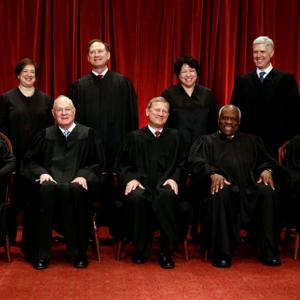
Melissa Rogers served as special assistant to President Barack Obama and as executive director of the White House Office of Faith-Based and Neighborhood Partnerships (2013-2017). She is now a visiting professor at Wake Forest University’s School of Divinity. Her book Faith in American Public Life was published in October 2019 (Baylor University Press, 2019).
Posts By This Author
Key Principles for White House Faith-Based Partnerships
In May 2018, more than a year after taking office, President Donald Trump issued an executive order establishing the position of adviser to his “Faith and Opportunity Initiative.” Last week, more than a year after the issuance of that executive order, and only a year before the next presidential election, the White House confirmed that it has tapped televangelist Paula White to fill this role. In light of these developments, it’s a good time to take a brief look at the history of White House partnerships with faith-based and neighborhood organizations as well as standards that should be used to evaluate such work.
Six Issues of the Supreme Court's Trinity Lutheran Church-State Case
It may take years to fully grasp the import of the Supreme Court’s decision in Trinity Lutheran Church v. Comer, where the court ruled 7-2 that the state of Missouri had expressly and unjustifiably discriminated against a church by disqualifying it from receiving a public benefit (scrap tire to enhance playground safety) solely because of the church’s religious character.
But here are six initial observations about the ruling:
Obama and the Two Types of Marriage
In the wake of President Obama's declaration of his personal support for the right of same-sex couples to marry under civil law, the nation is understandably focused on debating the merits of this position. Three related points from President Obama's announcement, however, deserve our attention as well.
First, President Obama noted that there is an important difference between civil marriage and religious marriage. The state defines civil marriage, which serves as the gateway for a wide variety of government benefits, rights and privileges. Religious marriage, on the other hand, is defined solely by religious communities.
These categories may be fuzzy in our minds because current law not only respects the ability of clergy and religious communities to define and bless religious marriage, it also allows clergy to solemnize civil marriage. That's why one often hears a minister conclude a wedding by saying, "By the authority vested in me by the state of X, I now pronounce you husband and wife."
Setting aside the oddity of a minister claiming the authority of the state rather than a higher power, the fact that the state allows clergy to bring a civil marriage into being does not mean it can require clergy to bless or recognize any relationship the state defines as civil marriage.
A Hire Law for Churches
The Supreme Court decision on the ministerial exception deserves a "hosanna" — and prayerful consideration.
The Court Has Spoken. Now What?: Hosanna-Tabor Evangelical Lutheran Church & School v. EEOC

"Stop the Intersection of Church and State." Image via Wylio, http://bit.ly/yAHnfE
With its unanimous ruling in Hosanna-Tabor Church & School v. EEOC last month, the United States Supreme Court handed down one of its most important church-state decisions in decades. The First Amendment bars ministers from suing the religious communities they serve regarding the terms and conditions of their employment, it said.
The Court affirmed what lower courts had held for decades: Religious bodies, not the government, must have the power to decide which individuals will minister to the faithful. This doctrine is known as the “ministerial exception.” The Court also held that the former teacher in this case, Cheryl Perich, was a minister and thus her lawsuit under the Americans with Disabilities Act (ADA) could not proceed.
An important aspect of the Hosanna-Tabor ruling is the Court’s recognition that there is simply is no good way for the state to police these matters – it inevitably ends up intruding on core religious decisions like who should speak to and for the church. When a minister is fired, the religious employer cites a religious reason for doing so, such as sermons that are inconsistent with Biblical teachings and a failure to challenge congregants to follow Jesus Christ. If the minister then sues the church for discrimination, he or she claims the religious reason wasn’t the “real” reason for the church’s actions; it was just a pretext for discrimination.
Charitable Choice
Threat to Religion
Should houses of worship and other religious organizations increase their efforts to assist people moving from welfare to work? Absolutely. Should they do so by following the model established by the charitable choice provision of the welfare reform law? Absolutely not. Charitable choice is unconstitutional, unwise, and unnecessary.
Unconstitutional. Charitable choice ignores important legal distinctions that protect religion. For many years, groups that have ties to religious bodies, but are not pervasively sectarian (such as Catholic Charities and Lutheran Services in America), have received government money to perform secular social services, provided that they do not proselytize or discriminate on the basis of religion in hiring.
Courts generally have refused, however, to permit the government to subsidize pervasively sectarian entities, such as a church or a drug rehabilitation group that relies on acceptance of the gospel. Why? The Constitution recognizes that individual citizens, not the government, should choose whether their money supports the missions of Methodists, Mormons, Baptists, or Buddhists.
It doesn’t solve the constitutional problem to restrict the use of tax money for secular purposes. In pervasively sectarian ministries, it is almost impossible and always unwise for government to try to separate sacred from secular. When government attempts to do so, it becomes excessively entangled with the ministry, which is itself unconstitutional. Charitable choice attempts to obliterate the legal distinction between religiously affiliated and pervasively sectarian institutions, allowing both to receive tax funds.


